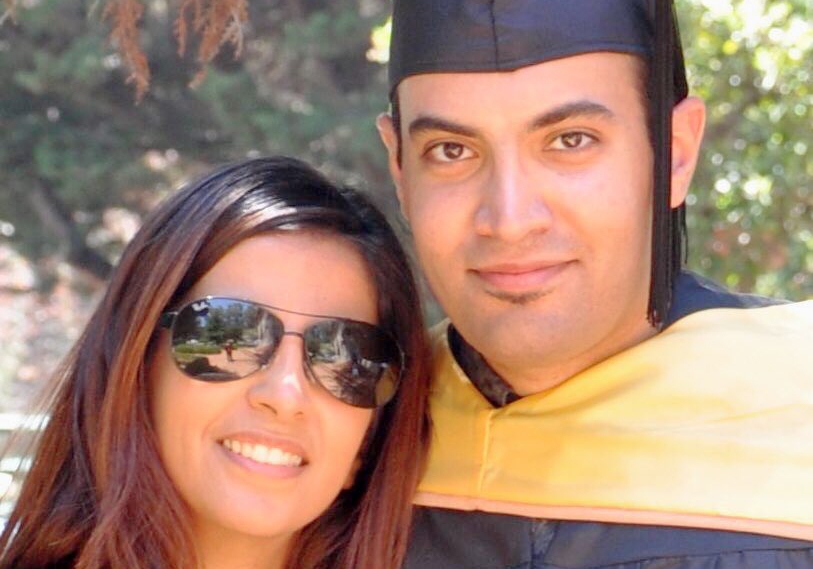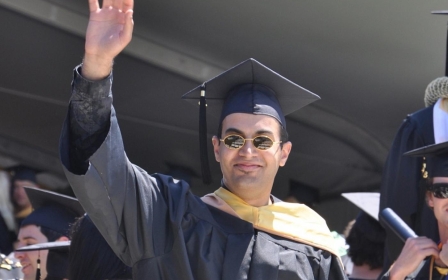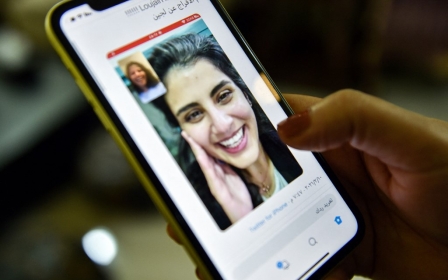Detained Saudi aid worker expected to be released soon, sister says

Saudi aid worker Abdulrahman al-Sadhan is expected to be released "soon", his sister said in a tweet on Monday, after spending nearly three years in detention without charge.
Sadhan, 37, was detained in March 2018 from his place of work at the Red Crescent offices in Riyadh. He was arrested without a warrant or charge and his family initially knew nothing of his whereabouts.
"What great news this morning… My brother called my family in Riyadh, the 2nd time in nearly 3 years," Areej al-Sadhan wrote on Twitter.
"No charges against him. Saudi officials told him he'll be released soon. We can't wait to see him! I will keep fighting for him till I see him free & back with us."
His release would come just days after Saudi activist Loujain al-Hathloul was released from prison.
Although she is no longer in prison, the activist, who faced torture and sexual harassment in detention, according to rights groups and family members, is still under a travel ban.
Last week, Sadhan's sister Areej told Middle East Eye that during her family's first call with him since he was detained, it was "amazing to finally hear from him because at least we knew he was alive".
"After Khashoggi, you just never know," she said, sharing that the call lasted only one minute.
Should Sadhan be released, the decision would come just a month after the inauguration of US President Joe Biden, who has vowed to "reassess" relations with Riyadh and prioritise human rights when dealing with the kingdom.
The administration had been particularly critical of Riyadh when it came to the detention of Hathloul and other rights activists in the kingdom.
"We, of course, expect Saudi Arabia to improve its record on human rights," White House press secretary Jen Psaki said earlier this month. "That includes releasing political prisoners such as women's rights advocates from Saudi jails."
Twitter crackdown
While Riyadh did not charge Sadhan with any crimes, his detention is believed to be linked to an anonymous Twitter account he ran where he used to comment on human rights and social justice issues in Saudi Arabia. According to his sister, Sadhan's account had amassed thousands of followers.
In 2015, two former Twitter employees were accused of accessing and passing the details of more than 6,000 users critical of Riyadh to a Saudi official with close ties to the royal family.
Bloomberg reported in August 2020 that Sadhan's disappearance was a direct result of the actions of the alleged Twitter spies.
The use of unnamed social media profiles is a common practice in the kingdom, where free speech is heavily curtailed and dissenting voices are cracked down upon.
In August 2017, former royal court adviser Saud al-Qahtani started what he called the "Black List" hashtag, which was used to target critics of the government, tweeting that the government had ways to find anonymous Twitter users.
Qahtani's profile has since been banned for violating Twitter's manipulation policies. He previously served as a close aide to Crown Prince Mohammed bin Salman until he was removed after being implicated in the 2018 murder of journalist Jamal Khashoggi at the Saudi consulate in Istanbul.
'Only one small positive step'
While rights groups have welcomed the recent release of high-profile activists Hathloul and Nouf Abdulaziz, they are still calling on the US to place pressure on Riyadh to continue releasing political prisoners.
A number of Saudi activists, including Nassima al-Sadah, Samar Badawi, and Eman al-Nafjan, among others, remain behind bars.
Seth Binder, advocacy officer at the Project on Middle East Democracy (Pomed), said that Sadhan's expected release is welcome news because the "entire al-Sadhan family have already suffered so much after nearly three years of an unjust imprisonment".
"However, it is only one small positive step clearly aimed to appease the US administration, but is undercut by other actions like the recent sentencing of human rights activist Israa al-Ghomgham and five others," he told MEE.
"US pressure is helping, but the Saudis are continuing to push to see what they can get away with because they obviously don't want to implement real reforms."
Middle East Eye propose une couverture et une analyse indépendantes et incomparables du Moyen-Orient, de l’Afrique du Nord et d’autres régions du monde. Pour en savoir plus sur la reprise de ce contenu et les frais qui s’appliquent, veuillez remplir ce formulaire [en anglais]. Pour en savoir plus sur MEE, cliquez ici [en anglais].




